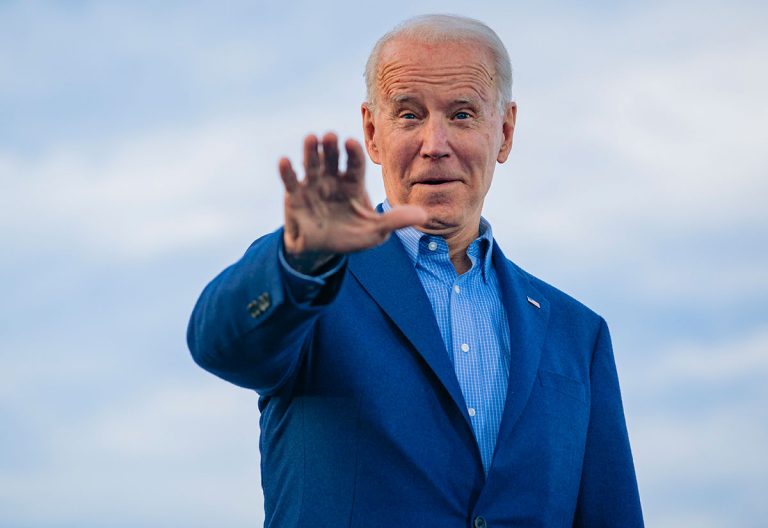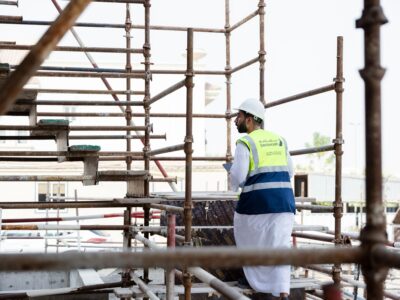A reversal of the Trump administration’s immigration policies, efforts to combat anti-Arab discrimination and support for a MENA ethnicity category on the US census are among the policy promises the Joe Biden campaign is making to woo Arab-American voters, according to a campaign document outlining Biden’s plans for the community.
In a platform released earlier in his campaign, Biden outlined his positions on a number of specific domestic and foreign policy issues that are broadly of interest to Arab-American voters.
According to the platform, if elected Biden will take steps to reverse a number of “un-American” Trump policies, such as “Muslim travel and refugee bans.”
“Biden will re-establish the United States as a welcoming destination for those seeking to pursue the American dream, including immigrants from the Arab World,” the platform says. “Prohibiting the populations of entire countries from coming to the United States is morally wrong.”
Additionally, Biden vowed to instruct the US Department of Homeland Security to undertake a review of “watchlist” and “no-fly” processes to ensure that they don’t negatively impact certain nationalities and ethnicities, as well as “confront systematic racism.”
“The new administration will work to protect communities that are under siege from the growing threat of violence from white supremacists and incitement to violence by far-right extremists,” the platform notes, adding that Biden will also end the Trump administration’s Targeted Violence and Terrorism Prevention Program.”
To ensure that civil rights are protected, Biden has vowed to work with Arab-American community leaders on issues including surveillance, policing and counter-terrorism, “in tandem with other communities historically affected by securitized relationships with the US government.”
Other campaign promises to support a MENA category on the US census, as well as conduct an independent study regarding the possibility of declaring Arab-American businesses “disadvantaged” to ensure equal access to federal procurement contracts and opportunities.
The Trump administration has not published any platform specifically aimed at the Arab-American community.
 Image: Getty Images
Image: Getty Images
President Donald Trump squares off against the Democratic challenger later on Thursday in what promises to be a bruising final debate with less than two weeks left in their turbulent fight for the White House.
The pair’s last televised showdown spiralled into an ugly confrontation marred by interruptions and name calling, prompting organisers to introduce mic-muting this time to try to keep things civil.
In terms of foreign policy, the Biden campaign platform promises to “help the people of the Arab world address the challenges they face, whether they are rising up in protest, suffering from repression, or living through civil war.”
Specifically, the platform notes that a Biden administration which place a greater emphasis on human rights and “democratic principles”, ensure that Israelis and Palestinians enjoy “equal measures of freedom [and] security”, oppose settlements, and work to reopen the PLO [Palestinian Liberation Organization] mission in Washington DC.
In Lebanon, the Biden platform says that his administration will work to bolster Lebanese civil society, as well as help the country recover from the Beirut port explosion and manage the millions of refugees that live on its territory.
‘You will have a seat at the table’
Earlier this week, Biden’s wife, Jill, was on the campaign trail on his behalf in Dearborn, a Michigan city in which 46 percent of approximately 94,000 residents are Arab-American – the largest percentage of any city in America.
Speaking today at Shatila Bakery in Dearborn to Arab-Americans, Jill Biden @DrBiden said they will have “a seat at the table” in Joe Biden’s administration. She said they “have contributed so much to our nation.” pic.twitter.com/krEcFFyiYc
— Niraj Warikoo (@nwarikoo) October 20, 2020
Speaking to local residents at a bakery founded by Lebanese immigrants, she said that Arab-Americans will “have a seat at the table” in a Biden administration.
“Joe Biden will be a president for all Americans,” she said. “But he can’t do it without you.”
“Your community matters to this campaign,” Biden added. ” Right now, there are so many who would tell us that our nation is hopelessly divided, that our differences are irreconcilable, that our communities are fractured.”
Speaking today at Shatila Bakery in Dearborn to Arab-Americans, Jill Biden @DrBiden said they will have “a seat at the table” in Joe Biden’s administration. She said they “have contributed so much to our nation.” pic.twitter.com/krEcFFyiYc
— Niraj Warikoo (@nwarikoo) October 20, 2020
The event was also attended by a number of prominent Arab-Americans, including Palestinian-American congresswoman Rashida Tlaib.
A welcome move?
Across the US, Biden’s overtures to the Arab-American community have been met with cautious optimism by Arab-origin US citizens and foreign analysts and policy experts.
Mohammed Soliman, a senior associate at McLarty Associates, a strategic advisory firm based in Washington DC, said that the platform “is an excellent acknowledgment of the community.”
“While Joe Biden wasn’t the first choice for many Arab Americans, widespread opposition to President Trump is bringing Arab American voters into Biden’s camp, and work with Biden on Arab Americans’ pressing issues,” he added.
Similarly, Sarah Elzeini, the CEO and founder of SMZ International Group, a DC-based global advisory and strategic activities company, said that the Arab-American felt excluded from the Trump administration “from the start”.
 Sarah Elzeini, the CEO and founder of SMZ International Group
Sarah Elzeini, the CEO and founder of SMZ International Group
“The community was not engaged or plugged in,” she added. “When criticism touched their community, the administration fell silent. For me, this was very upsetting, as Arabs and Muslims in America represent a massive demographic.”
According to Elzeini, this alienation drove the community – large parts of which are socially conservative – towards the left and into the hands of the Democrats.
“They were made to feel they belonged. In the end, this is what the community wants to feel. It’s what any community wants to feel,” she said. “They feel that under the Democrats.”
‘Muslim Voices for Trump’
To date, the Trump administration has not published any platform specifically aimed at the Arab-American community.
In mid-August, however, the Trump campaign launched a ‘Muslim Voices for Trump’ coalition and website.
“Muslim Voices for Trump will energise and mobilise the Muslim community in re-electing President Donald J. Trump by sharing many successes of the Trump administration,” its website says. “Trump will ensure the protection of religious liberties, economic prosperity and educational opportunities for Muslims in America.”
 Image: Getty Images
Image: Getty Images
Although the page includes a sign-up form, no specific policy initiatives are mentioned.
On October 13, a Zoom call held by the group quickly descended into chaos after being or “Zoom bombed” by anti-Trump activists, who interrupted remarks by co-chair Farhana Shifa and Mike Mears, the director of faith engagement at the Republican National Committee. The meeting was abandoned in approximately 20 minutes.
Before the interruption, Mears said that the GOP hopes to “rectify” neglect of the Muslim community in the US.
Five Things We Learned:
- The Joe Biden campaign has a dedicated platform aimed at Arab-American voters
- The platform includes both domestic and foreign policy initiatives
- In the heavily Arab-American city of Dearborn, Jill Biden promised that Arab-Americans would be included in the administration
- The move has been welcomed by Arab-Americans, some of whom felt alienated by the Trump administration
- While there is no specific platform for Arab-Americans, the Trump campaign has set up a ‘Muslim Voices For Trump’ coalition and website







